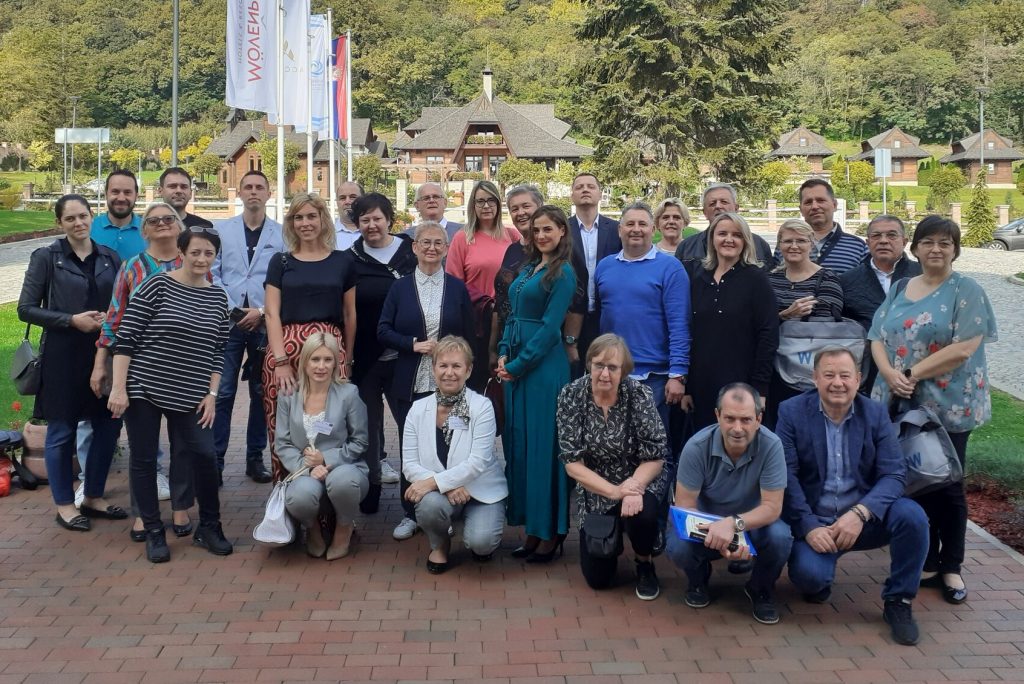New skills and new capacities are needed in the trade union movement. Especially in the Western Balkan region. Trade union education is a strategic tool for building strong, independent, and representative trade unions that can respond to the challenges of nowadays.
During a two-day seminar which took place in Vrdnik, Serbia on 13 and 14 October 2022 around 40 trade union leaders from ten European countries discussed the importance of trade union education. The seminar titled: “The key role of trade union education. Spreading awareness of the necessity of trade unions” was organized by the World Organization of Workers (WOW) and RS BOFOS in cooperation with the European Centre for Workers’ Questions (EZA) and supported by the European Commission.
For trade unions it is important to learn how to support and execute the major tasks and functions of trade union work in the areas of trade union education, organizing, workers’ rights, employment policies, social protection, labour relations/collective bargaining and digitalization of economy. One important way to achieve all of the above is through the ability of public speaking. To get across what you want to say. Radovan Perovi?, Director of the Center for Public Speaking in Novi Sad, Serbia focussed on how to have a successful public performance. The 21st century has brought incredible things, but we are overflowed with information. How to stand out as an organization, company, person has become very difficult. Focusing on what is important in communication and public speaking really makes a difference.
Bianca Föhrer, Research Project Manager at University College Dublin (UCD), School of Business, Dublin (Ireland) approached the topic of trade union education more in a descriptive form. She focused on (Trade Union) Education, the Concept of Transnational Competence, Old & New Labour Internationalism, and Solidarity – What is it (not)? Föhrer defined Transnational Competence as “a complementary composition of knowledge, attitudes and skills which enables human beings to interact autonomously and responsibly beyond national boundaries with respect, as equals and in kindness”. When looking at developments towards a New Labour Internationalism we see that “unionization becomes part of a broader fight for social justice, in which labour works [together] with human rights, environmental, religious, student, feminist and other community groups” (Baccaro et al., 2003: 122/3) “[…] and last but not least, a vision for an alternative social order”. This we see happening today and it is important to realize this and at times form (often temporary) groups of likeminded persons/organizations.
As Psychotherapist, Coach, Educator, Vesna Danilovac looked at trade union education from a more emotional point of view. Many people work on automatic pilot. Emotions are often discarded. This while our emotional health is extremely important. A person can have 450 emotions a day, which shows that we should take care of them. By leaving our zone of comfort we raise our level of confidence. Spiritual energy comes from the things we do for ourselves. The things we love to do. Being good for ourselves is also good for others. Educating ourselves, leaving our conform zone, will develop us as persons (and organizations alike).
Another important aspect for achieving the spread of awareness is by knowing how to understand and influence others. Dejan Pralica, Prof., PhD, Coordinator MA Communicology & PhD Interdisciplinary studies, University of Novi Sad – Faculty of Philosophy – Department of Media Studies Novi Sad, Vojvodina (Serbia) first gave some practical tools for doing just that after which the participants were asked to work in groups. In the first session by the employer while in the second session the employee. The changing perspective gave a completely different starting point, but also gave an insight on the point of view of the counterpart.
The following day Valentina Franca, Associate Professor and Researcher of Labour Law at the Faculty of Public Administration at University of Ljubljana (Slovenia) focused on the union strategies and activities to overcome the workplace skills gap. She did so by asking questions such as ‘Do you have the right skills for your job?’, and ‘Were you offered training (external/internal) by the employer?’ Statistics show that several groups on the labour-market participate differently in education. Trade unions and employers alike should be aware of this. During COVID these situation only worsened. Education and training should be considered more important. There is a need to upscale (digital) skills. And it should be considered adding value. Trade unions should take a role in this by offering lifelong learning opportunities for workers for example.
A group that is often hit hard are the youth. Those who are about to start working or just started. The main questions asked by Lili Grandiek, Project worker at CNV Vakmensen (the Netherlands) were ‘How can trade unions organize themselves to make use of their potential and to attract and bind especially the younger generations to them? How to be a relevant social movement in 2022?’. The often called unlucky generation’ is faced with numerous challenges, such as the flexibilization of the labour-market, the high unemployment rate amongst young people, the influence of social media on their lives, and the performance-oriented society which demands a lot. This shows that there is a real need for security. Trade unions have an enormous potential to respond and fit to all these issues. They have the experience and tools for this, but they do not use this potential. Young people want to be taken seriously. They are active on many levels and not indifferent as often portrayed. They just do things in a different way. So we should open a debate with them and not about them. Include them in decision-making processes. Society will surely benefit from this.
What all speakers were clear about is the importance of education and training. These form intrinsic parts of the development of a society. What became clear is that education can have many shapes and forms. But that in the end it pays off. As a result the individual, the employer and society as a whole benefits. But it is important to look at the kind of education required and whom it fits best. This is something for the employers and the trade unions to take in account. And why not make use of this potential?





